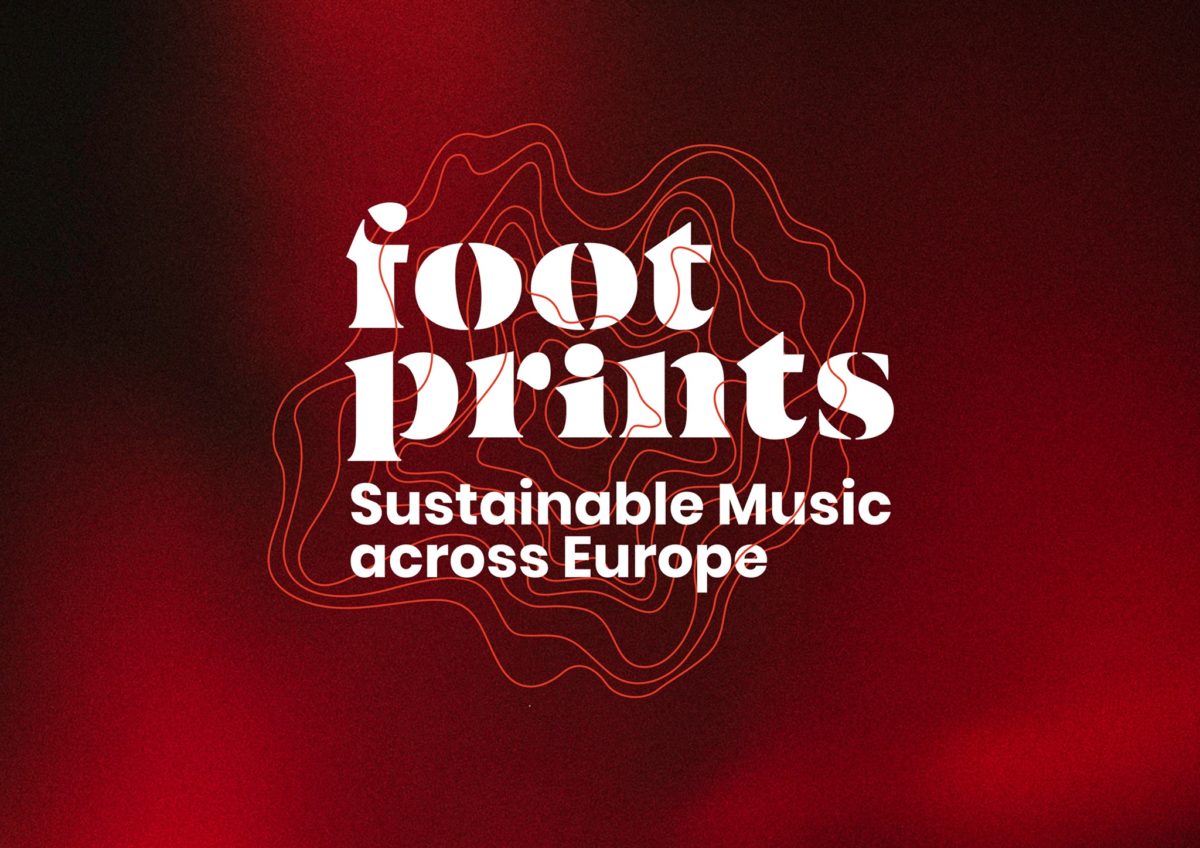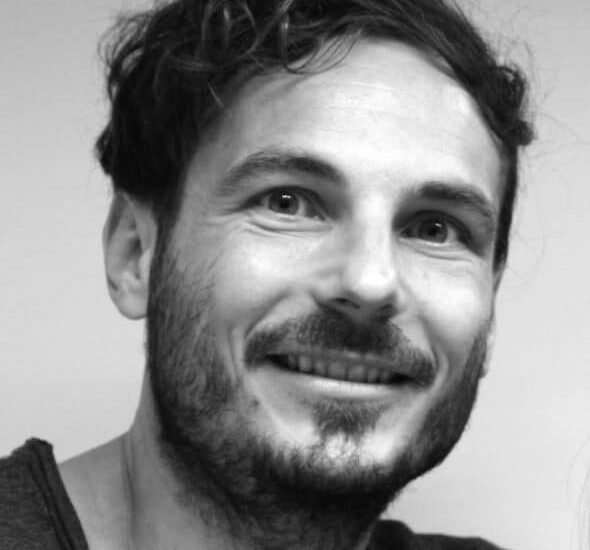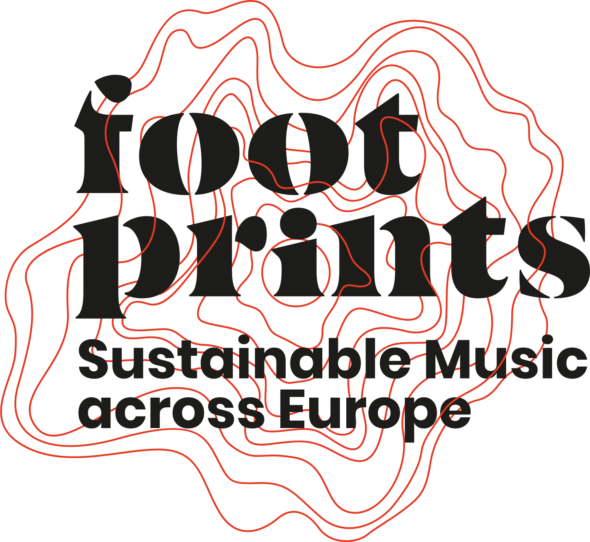“I can only work for music which completely gets me” – Tom Tanzer Music Manager and Footprints Agent 2021

From 2021 to 2022, FOOTPRINTS is spearheading the promotion of 6 agents to support them in developing their European network. In light of this upcoming event in June, Arianna Fleur spoke to TOM TANZER about the Austrian and international music business, possibilities for progress, best practice, and what a more sustainable future could look like.
he Footprints Agents meeting 2021 has a number of key focal points, one of which is “sustainability”. How does this term relate to your work as a manager?
Tom Tanzer: Well you know about our ReCycling Tour (see interview with Manu Delago). So for my work, especially currently, it’s about developing eco-friendly approaches to touring. And, I’ll quote Manu here: ‘you just have to start somewhere.’ So while you know that you are not gonna change the world with just one tour, still, taking little steps like with the ReCycling Tour – trying to reduce CO2 output and waste, eating and sleeping locally, and trying to set an example – you hope it has an impact somehow, even if we don’t know yet exactly in what way.
Has the ReCycling Tour changed your view of how you see the work you’re doing with other bands? And has it given you ideas for how you can make changes with regard to sustainability in your future work?
Tom Tanzer: I think it’s important to question yourself and also share ideas with other bands. Like, for example, putting in the hospitality rider that there should be no plastic products backstage. Again, I know these little things won’t change the world, but I do think musicians act as role models and have the potential to inspire people to change their behavior to an extent. But when it comes to the ReCycling Tour, of course not everyone can reproduce it. It’s a special project. But, actually, there was this nice example that Manu found, of someone who had a similar tour well before us, 250 years ago: Amadeus Mozart. (laughs) He did a European tour for three and a half years – on horse and carriage, of course.

“You hope it has an impact somehow, even if we don’t know yet exactly in what way“
Do you think the appearance of the pandemic will have long term effects on how musicians tour?
Tom Tanzer: Yeah, because till recently we had the possibility to fly everywhere in Europe within two or three hours. So, it was possible to do this crazy routing. But then comes the question of, should we blame ourselves or should we blame the capitalistic world, you know, who offers us to fly everywhere that easily? Of course part of it is our responsibility, but it’s more complex than just individual choices. For example, I know a very self-reflective pilot who has a lot of examples of why planes are more eco-friendly than cars, but also than trains, because the infrastructure around it is so big and all the railways you have to produce and maintain. So regarding flying, it certainly got a bad reputation because of the air pollution, but, you have to really be cautious regarding the different issues and really analyze them; not just easily go out and say, ‘flying is the worst.’
From a managerial perspective, you’ve now taken on a whole other beast; you’re not just responsible for marketing what you know – music – but suddenly you’re having to integrate it with actions and messages of environmental protection and education. It must be a very difficult balancing act, juggling all these big topics with sometimes (often) conflicting interests.
Tom Tanzer: I mean, for example, we could decide to make the ReCycling Tour an annual event, for example. But with the example of an artist like Manu, who is very international at this point, the question is how much you want to limit that exchange, of him and his music with the world. I think it’s about finding a balance, and becoming more conscious of what and how you do things. For example, we have a show (hopefully!) in Georgia on the Black Sea in summer. And they will fly there, so Manu decided to stay there for a week and enjoy some hiking in the mountains afterwards. This is an example of trying to maximize the time spent somewhere, and not just having two flights in two days. Maybe this is a result of the pandemic; to slow down a little bit and not take the next festival on the same weekend. I mean, it’s easier said than done because the times are still a bit crazy. And we don’t know what will happen in one or two years when hopefully everything is normal again and you can book more shows. And so you ask yourself: are you gonna go back to the old way of fast touring, or will you say, ‘no, I don’t want to play this game again’. Or maybe the shift comes with age. But, as a young artist, the competition is so hard. There’s so much music out there nowadays, which is great, but you really have to hustle to make it, and that doesn’t leave a lot of space for slowness.
Do you think there is any way to become an internationally renowned artist without traveling internationally?
Tom Tanzer: We all know that the internet is not the world we want to live in, at least not our generation; but not the younger generations, either. We all want to meet people and see live music, I think. So, I guess my answer is: No. The internet made up for the void in the times of corona, and I think that would be the only solution to reduce travel in the future. But it’s not the ultimate solution.
It used to be quite “cool” to say: ‘Yeah, I flew to Melbourne last week, then straight to Paris, and now I’m in LA,’ for example. I wonder if the appeal of that kind of jet-set touring will also see a decline, even after things go back to “normal”, because people will be more critical of that kind of traveling behavior.
Tom Tanzer: Yeah I was talking to a friend about California the other day, a place that I really love, and then I realized: maybe I will never go there again, just because it feels so far away. My perception of travel has changed a lot. Even going to France now for the Footprints residency feels strange in a way. Also to meet so many people in person. I mean, I’m still super motivated. You can see all the hard work we’ve been doing for the ReCycling Tour, and I’m planning lots of releases and campaigns, for the other groups I’m managing. So I’m still eager, but the workflow has changed. Not that home office is new to me! Still, the world has changed, and I’ve changed with it – for now at least
Can you tell me about the releases that are coming up and what you’re working on?
Tom Tanzer: I’m working on two albums right now. Once Manu’s current tour ends, we’re going to have a very long and intense singles campaign with the album dropping in September. And then, of course, a lot of touring is being planned as well.
I do think that musicians act as roIe models and have the potential to inspire people to change their behaviour “
The process of preparation for the ReCycling Tour was a long and intensive one – 2.5 years in total. Has working on this project changed the way you view the music business in general?
Tom Tanzer: Yeah, I think not only this tour, but in general, these past one or two years have given me another perspective on that topic of, again, sustainability. I think it’s made me rethink how big a concert really should be. Is it necessary or “right” to have these colossal events? Of course I can say that very easily because I work with bands who don’t have these insanely large audiences like the biggest global pop bands. Of course it’s not my place to say, ‘OK, now all that stuff has to end because it’s polluting our planet.’ Plus, one can’t forget all the people that rely on these big events, and all the jobs they create, like the sound engineers, the back-liners, or people working behind the bar, etc., So I don’t want to be ignorant or insensitive about this, but when it comes to sustainability and the environment, there are things to talk about. But I can say, I feel lucky to live in a socially supported region, where funding possibilities help me and my musicians, so that we don’t have to chase after every cent, and make that the biggest focus of our work.
So you’re drawing a connection between politics, the social safety net and ecologically friendly working structures in the music market?
Tom Tanzer: Definitely. For example, what we have now – this monthly basic living stipend (which basically can be compared with a “Grundeinkommen”) due to the pandemic – it has larger implications than just individual people having enough to survive. If everyone gets that kind of support from the government, maybe we would see our jobs in the music industry differently. And we wouldn’t have to hustle the way we do, you know, taking all these jobs and gigs at whatever cost to the environment. If you have a little bit of a cushion, then you can actually make certain decisions that are based on other factors, such as human rights and the environment. So the concept of sustainability in the music world is really multifaceted. Well, I think this brings us to topics we could talk for hours about! (laughs)
THE CONCEPT OF SUSTAINABILITY IN THE MUSIC WORLD IS REALLY MULTIFACETED
Save them for the Footprints meeting! (laughs) So your first client was Manu Delago. But at this point you have several projects. How have you chosen your artists or, maybe more precisely, how have you decided to say yes to certain artists (and no to others)? Have you ever considered expanding your roster and team?
Tom Tanzer: Well, I can say I’m very picky and idealistic. I can only work for people producing music, which completely gets me. In addition to that, you know, Manu and I have a long friendship. We even played in a rock band together something like 20 years ago. So that working relationship grew naturally. But I never got to a place where I thought, ‘OK, now I’m going to open up a big company and then I’ll manage 50 bands and make as much money as possible.’ I’m definitely not like this. And I remember when I was asked to come to see 5K HD live. And I was just blown away and I really felt honored to be asked to manage them. It was very easy to say yes, because I just loved the music. Of course, after several years in the business and getting a reputation, you get asked by a lot of bands to manage them. But yeah, I’m just very selective, and also I don’t want to run a big company. I want to remain small and stay dedicated to my clients. And just because you think you can make money with a certain act, because they have catchy songs which could be played on the radio – I don’t care about all this. And the artists I work with share these values with me.
The artists you manage are in the first place Austrians, however, they have international relationships, recognition and appeal. Speaking of crossing borders, what are the countries that you feel you have the best relationship with or that you think are the easiest to gain a foothold in?
Tom Tanzer: That’s pretty interesting because people think everything has become so international and we’re all so connected with the Internet; and we only have to write a couple of mails and sometimes make a phone call and you will get a gig everywhere. But it’s not that easy. We have the feeling that we are so globalized, but when it comes to music markets, it’s not the reality. When it comes to building up an artist’s profile in a different country, it’s easier among German speaking countries. I honestly don’t know why that is, but somehow it still feels like languages make a difference. Then, of course, with having Manu based in London for so many years, we built up a good profile in the UK. But I would say, in general, it kind of just grows. Little by little, you start to have a bigger map somehow, especially in Europe. So it’s like when you have the German speaking countries and you have England, then you start to connect the regions in between. Benelux is a very interesting market of course. On the other hand, you have these very closed markets like France, Italy and Spain. Of course there is the U.S. and Japan. So we’re trying to, in a way, complete the map.
Then there are those territories that have an affinity for “homegrown artists”, for their own music scene. It’s a very interesting topic, which we discuss a lot. Like how much Austrian music has to be played on FM4 or Ö3. You know, you have to support the home music scene, but, equally, we are one planet and we are all the same. But then, we have to support our own bands in our own markets first. And that makes it very tough to become popular in other territories. So it’s a good and a bad thing, simultaneously.
“I can only work for people producing music, which completely gets me”
Once you’ve established a foothold in a country or region, how do you go on from there?
Tom Tanzer: I think you can make a step into a country, but the work certainly doesn’t stop there. My experience is that it all starts in the capital city. So, for example, once you have a good crowd in Berlin, Paris, Amsterdam or in London, you can start to grow in that country. And you just keep building from there. When it comes to the States, we’ve played a couple of tours mainly on the coasts or the biggest showcase festival SXSW, for example. But that country and continent just feels so big, like a different world. So, maybe now is the time to focus on Europe more. It’s also why Footprints makes sense, for example. And I mean with all these Export offices in Europe connecting and working together on all these showcases, I think at least there is a sense of being “one”. Somehow we try to have this European idea. But maybe it takes one or two more generations to really establish. But you can see the progress.
Networking is one of the focuses of the Footprints meeting, of course.
Tom Tanzer: Yeah, and I think we’re moving in a good direction here in Europe – you know to be able to network with people based basically everywhere on the continent. For example Eastern Europe doesn’t feel separate at all anymore. Things keep developing in the right way. So I think networking in Europe is quite easy.

What are you looking to get out of Footprints?
Tom Tanzer: To expand my network and to meet new people. I think it’s always interesting, of course, to learn more about the business. I mean, I don’t think that you can actually learn how to be a manager. It comes with experience. There’s no secret sauce! (laughs) But it’s just helpful to be able to exchange stories. And when it comes to the other participants, I think they chose very wisely. They didn’t invite any of the very big names working in large companies, but rather chose people like me who run their own small businesses.
Last question: What’s the best thing about being an Artists Manager, and what’s the worst thing?
Tom Tanzer: The best thing is not having a nine to five job, and worst thing is probably not having a nine to five job. (laughs.)”